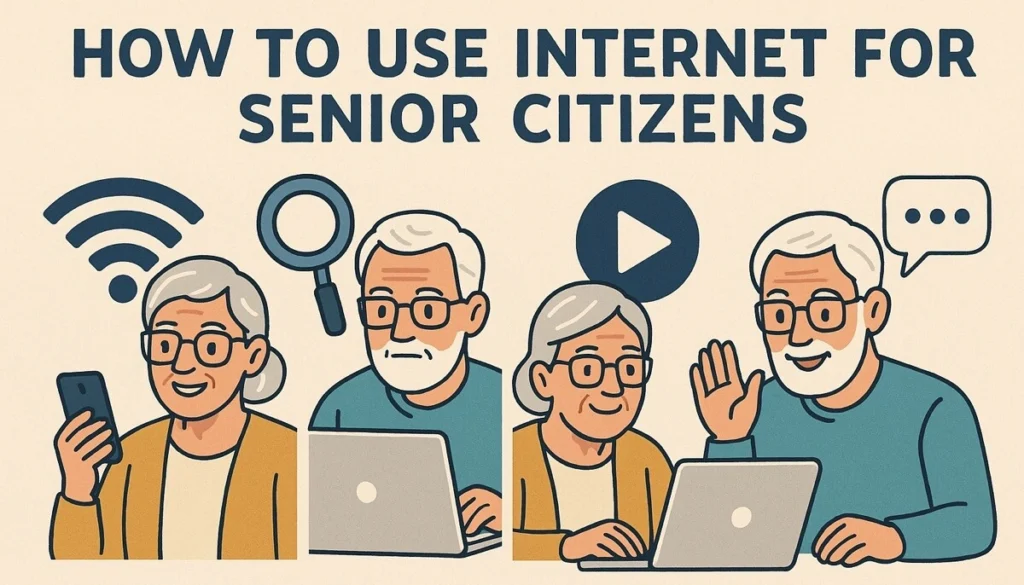Broadband for Pensioners Made Easy – Beginner’s Money-Saving Guide

Estimated reading time: 9 minutes
Summary
- Around 4.3 million UK households could save £200 yearly on broadband deals through a money-saving guide for pensioners.
- Many pensioners miss out on cheaper broadband options due to misunderstanding eligibility for social tariffs that require benefits like Pension Credit.
- Regular broadband deals often provide faster speeds and more options without needing to prove eligibility, potentially saving money for those who don’t qualify for social tariffs.
- Providers such as BT, Virgin Media, and Community Fibre offer affordable plans between £10 and £23 monthly, making it easier for pensioners to find suitable options.
- Staying informed about broadband choices, understanding eligibility, and comparing deals can help pensioners achieve better value and service.
Table of contents
Broadband for Pensioners – Beginners
Around 4.3 million UK households could save £200 yearly on broadband deals designed for pensioners and benefit recipients. Most of these savings are not used. Only 8.3% of eligible household use a money-saving guide and take advantage of these money-saving options.
Special broadband packages for people on Pension Credit or Universal Credit cost between £10 and £23 a month. These packages are substantially cheaper than standard ones but deliver the same reliable service. Broadband providers make these social tariffs accessible to more people online. This makes finding the best broadband deals for pensioners much easier.
Pensioner broadband deals work simply and straightforwardly. This money-saving guide will help you through everything about quality internet access for pensioners at fair prices. You’ll learn about BT broadband and landline deals along with other providers that help you avoid overpaying.
Can Pensioners Really Get Cheap Broadband?
Older people might be surprised that broadband companies don’t offer any broadband deals just for them. Social tariffs are out there, but you need to receive certain benefits to qualify. Most of the time, this means having Pension Credit to benefit from this money-saving guide.
Why most pensioners don’t qualify for social tariffs
The biggest problem is straightforward: you usually need Pension Credit to get these special rates. Many pensioners earn just a bit too much to qualify for Pension Credit, which means they can’t access these cheaper packages. About half of all pensioners don’t know these discounted deals exist, and 34% aren’t sure how to switch to a cheaper tariff.
Different providers set their own rules and money-saving guides:
- Virgin Media needs proof of Pension Credit, Universal Credit, Income Support, or other specific benefits
- Vodafone’s criteria has more support schemes, including Pension Credit, Disability Allowance, and Personal Independence Payment
- Hyperoptic lets you qualify if you get Pension Credit, Housing Benefit, and several other support programs
BT makes things even tougher by asking specifically for Guarantee Credit (a top-up to Pension Credit).
Regular deals might work better than social tariffs
Social tariffs sound affordable, but they’re not always your best bet. Regular broadband deals often give you:
- Faster speeds than social tariffs
- More choices of providers UK-wide
- No need to prove you get benefits
Many big providers offer new customer deals and money-saving guides between £20-25 monthly. Community Fibre offers a special low-cost plan for everyone. There are no checks to see if you qualify, so anyone can sign up, no matter their benefits.
You should think about what you really need when picking between social tariffs and standard packages. A simple package with lower speeds might work perfectly if you just browse websites, check emails, and read news.
Eligibility Rules and How to Navigate Them
Saving money on broadband for pensioners starts with understanding the rules. You can reduce your monthly bills by checking which benefits you can get and how to apply for them.
Who qualifies for social tariffs and money-saving guides
Whether you can get social tariffs depends on the benefits you receive. Most providers give these discounted packages to people who receive:
- Pension Credit
- Universal Credit
- Income Support
- Jobseeker’s Allowance
- Employment and Support Allowance
- Personal Independence Payment (PIP)
However, each provider sets their own money-saving guide rules.
For example, Hyperoptic and KCOM help people who get Attendance Allowance. Vodafone helps those who receive Disability Living Allowance. Community Fibre has low-cost packages that are available to all pensioners without eligibility checks.
How providers verify your benefits for their money-saving guide rules
The benefit check process became much simpler in 2022.
Providers can check your benefit status right away using a system from the Department for Work and Pensions (DWP). You must give permission before they share any information.
The application needs just a few details:
- Your full name
- Date of birth
- Postcode
- Which qualifying benefit you receive
The DWP keeps your privacy in mind and shares minimal information. They only confirm if you get a qualifying benefit at the time they check. This means no complex paperwork or long waiting times for pensioners.
What to do if you’re denied a social tariff
Don’t give up right away if your application gets rejected. Ask the provider why they denied you. You could change their mind by giving them more information.
These alternatives help if you remain excluded:
- Talk to your current provider about affordable payment plans
- Switch to a cheaper regular package
- Ask for extra time to pay bills if needed
- Look for providers offering no-eligibility social tariffs
The government is working with internet companies. Because of this, 99% of people in the UK can get social tariffs. This makes finding affordable internet for pensioners possible with a little research.
Best Pensioner Broadband Deals and money-saving guides in the UK

In the UK, you can get cheap broadband deals for pensioners through social tariffs and regular deals from several providers. Here’s what major UK providers can offer you.
BT broadband and landline deals and money-saving guides explained
BT Home Essentials is a great choice for anyone receiving Pension Credit (Guarantee Credit). This social tariff gives you two speed options—36Mbps at £15 monthly or a faster 67Mbps at £20 monthly.
You’ll get a 12-month contract with no early exit fees if you need to cancel. The setup costs just £9.99 for postage and packaging. BT’s Smart Hub 2 router comes with the package and gives you reliable connection throughout your home.
BT Basic works well if you just need a landline. This phone-only package costs £5.10 monthly and includes £1.50 call credit.
Virgin Media’s flexible 30-day contracts
Virgin Media has two main packages for pensioners on benefits. The Essential package gives you 15Mbps speeds at £12.50 monthly, while Essential Plus delivers faster 54Mbps at £20 monthly. Both packages come with 30-day rolling contracts without any activation or exit fees. Your prices stay the same while you receive benefits.
Sky, NOW, Vodafone, and Hyperoptic options
Sky and NOW both give you Broadband Basics packages at £20 monthly with 36Mbps speeds and pay-as-you-go landline calls. Hyperoptic’s Fair Fibre Plan starts at £15 monthly, letting you choose between 50Mbps or 150Mbps speeds. Each package gives you free installation, unlimited data, and a monthly rolling contract with no exit fees.
Community Fibre‘s no-eligibility plan
Community Fibre’s Essential package stands out at £12.50 monthly for 35Mbps speeds with no need to prove benefits. They do not require any proof of government benefits. This makes it easy for retirees who cannot get regular social rates.
However, some providers, like Community Fibre, only work in certain areas. So, check what is available near you first.
Making the Switch and Preparing for the Future
Pensioners can change their broadband service easily if they have the right help and knowledge.
Money-saving guide – how to compare and switch providers
Start by checking available deals in your area. Customer reviews on sites like TrustPilot help you see how good the service is. Many providers offer rewards that reduce your monthly costs through cashback or vouchers.
Virgin Media’s customers receive £85 in bill credits as a switching incentive. The installation process needs someone aged 18 and over at home.
Understanding the Digital Voice landline change
By January 2027, the UK will complete its upgrade from analogue to digital service. Your phone calls will run through your broadband connection. People who rely on landlines when the power is out will get free backup options from their service providers.
Your landline service will remain active until your provider gets in touch with you about the change.
Tips for getting the most value from your plan and money-saving guide
The real cost includes setup fees, contract duration, and available rewards. New customers usually get the best deals. Providers often give £30 worth of bill credits or gift cards to welcome new subscribers.
Staying safe and avoiding scams online
Strong passwords combine letters, numbers, and special characters. Free antivirus programs like AVG protect your device effectively. Keep your personal information private and never share it through email. Banks rarely send emails asking for details, so watch out for scammers who pretend to be from financial institutions.
Conclusion and using the money-saving guides
Pensioners can easily find affordable broadband deals. Social tariffs give you great savings when you get qualifying benefits like Pension Credit. But these special rates might not always be your best option. Regular deals could work better if you don’t qualify for benefits or need faster internet speeds.
You’ll have more control when you know all your choices.
BT, Virgin Media, and Community Fibre have packages that cost between £10 and £23 a month. They do not require eligibility checks. These prices can save you much more than standard rates.
It’s worth checking the speeds you really need instead of paying extra. Lower-speed packages often give you everything you need to browse, check emails, and read news at the best price.
On top of that, you should know about the Digital Voice switch by 2027. Your landline will work with your internet connection. However, if you need your phone for emergencies, make sure your provider has a plan for power outages.
Take time to compare providers in your area before you decide. Look past the advertised price to think over setup costs, contract length, and any rewards. Doing some research helps you easily find a good balance between price and performance.
Using strong passwords and being careful with your personal details can help keep you safe online. The goal goes beyond cheap internet – you need reliable, continuous service that improves your daily life affordably.
See our Top 5 Pensioner Broadband Deals
Similar links:



